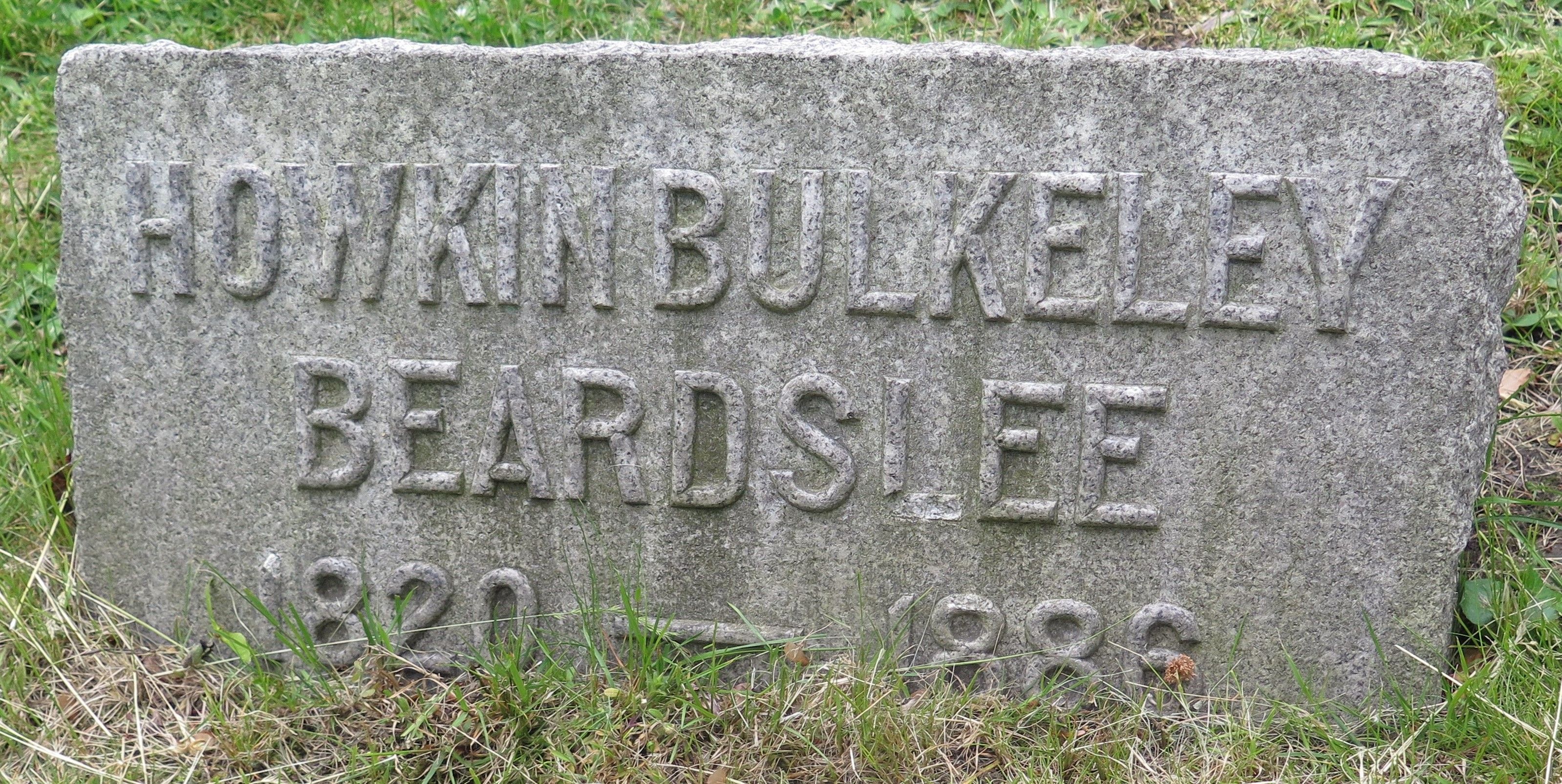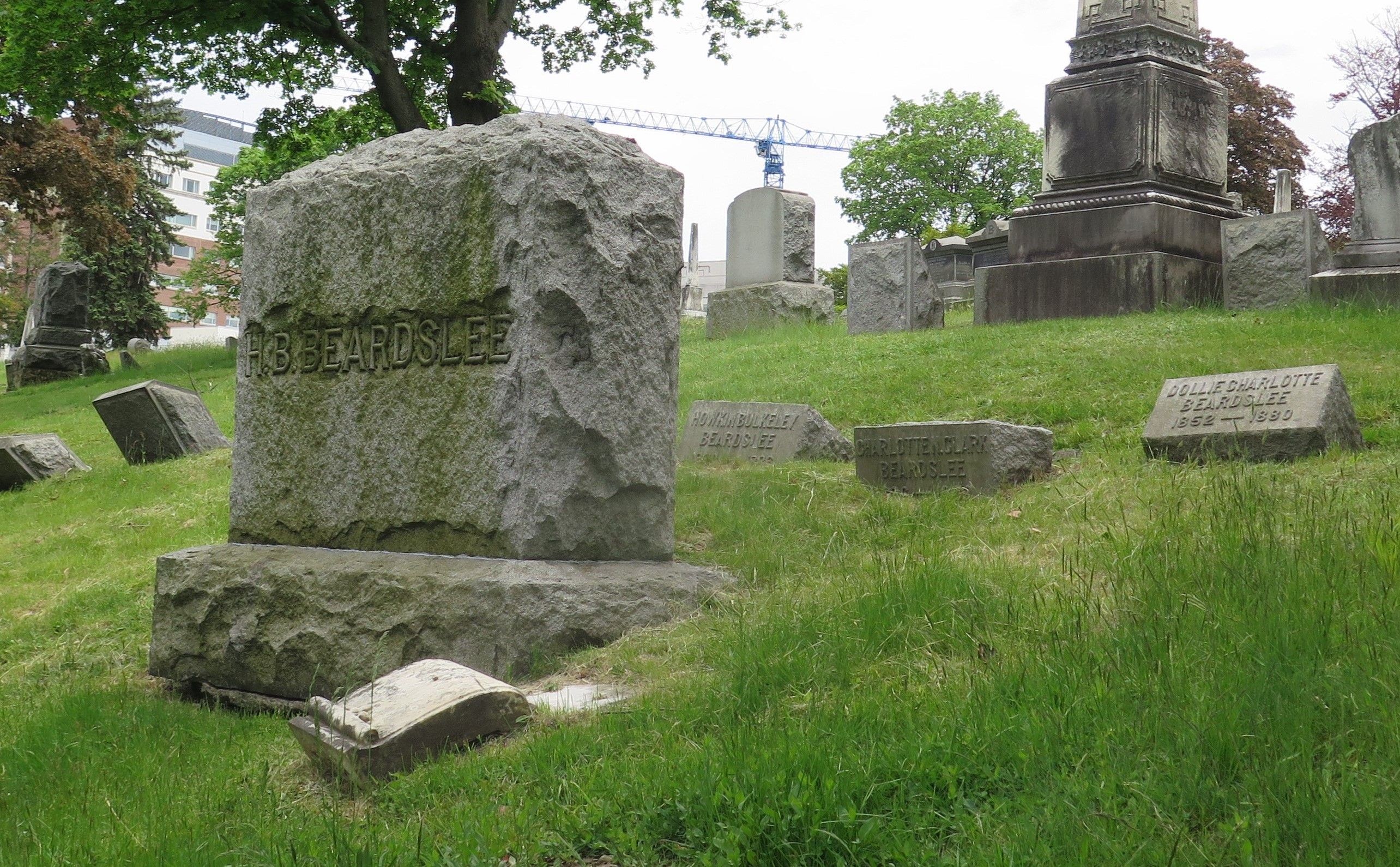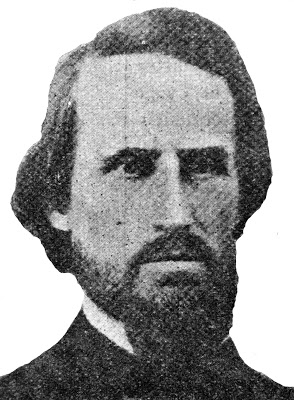Reinterred from Indian Orchard Cemetery to family plot - May 7, 1895.
Obituary--Hon. Howkin B. Beardslee.
At noon on Monday last the remains of Howkin Bulkley Beardslee were laid to rest in the pretty little cemetery at Indian Orchard, but a few steps from the site of the old homestead under the hills where the happy days of his childhood were spent. He died on Thursday, March 11th. For about a year he had been in failing health, but with that indomitable perseverance which was one of his characteristics, he performed his editorial duties upon his paper--the Luzerne Herald, published at Wilkes Barre--until a few weeks ago, when he reluctantly abandoned the field, and too late sought by a change of air and scene, to at least delay the progress of the terrible disease, consumption, which had secured a fatal hold upon his system. His first hope was to go South, and a letter from him to the writer hereof dated about the middle of January makes inquiries as to the trip, but contains the sad admission that he was even then scarcely able to get about. The Florida journey was abandoned, and instead he made his arrangements to visit his brother and sisters still residing on the Indian Orchard farm. He came over precisely three weeks before his death, and though they were doubtless weeks of pleasant social communion, they also covered a period of painful days and weary nights, ending at last in that sleep which knows no awaking.
Mr. Beardslee was born at Mount Pleasant township on the 28th of May, 1820. His father, Bulkley Beardslee, was a New England man of remarkable force of character, who came to Wayne county in its early days, and soon became one of its leading citizens. He married Lucretia, daughter of Walter Kimble, a sturdy pioneer, and shortly after the birth of Howkin, having bought the property of his father-in-law, removed to Indian Orchard, where for forty years or more he carried on an extensive business in lumbering and farming, in the meantime filling several local offices of importance, among them that of County Commissioner. Howkin proved to be a bright boy, and was given such educational advantages as the county at that time afforded. At a suitable age he entered the law office of Charles K. Robinson, and in due time was admitted to the Bar. Soon afterward he was elected District Attorney, then Register and Recorder, and it was while serving in the latter capacity--in 1847--that, in company with J. H. Norton, now of New York, he purchased the Wayne County Herald. He subsequently bought Mr. Norton's interest in the paper, and continued as its editor until September, 1861, when he sold the establishment to Menner & Ham. While proprietor of the party organ Mr. Beardslee was a political power in the county. He was almost continuously a member and frequently chairman of the Democratic County Committee, and was sent to nearly all of the conventions and conferences, State and district, in which Wayne was entitled to representation. Twice he received the county endorsement for Congress, but failing to secure the conference ratification was never elected to that body. He acted as deputy for treasurers Chase and Seaman, and was appointed postmaster at Honesdale by President Buchanan[1858]. In 1850 he was elected to the State Legislature, and the post-office was transferred to the late Hon. Isaiah Snyder, the holding of the two positions at the same time being prohibited by law. In 1868 he was elected to the State Senate, and in 1869 was appointed District Attorney to fill the vacancy created by the resignation of Hon. W. H. Dimmick.
In 1871 Mr. Beardslee moved to Wilkes-Barre, having purchased a half interest in the Luzerne Herald. His unyielding disposition when he believed himself to be in the right finally brought him into conflict with the then party leaders of our sister county, and the result was a change in the proprietorship of the paper in 1879. The means employed to this end Mr. Beardslee never ceased to characterize as outrageous in the last degree. Whether he was right or wrong in this estimate of the transaction is only known to the parties immediately concerned; but certain it is that it had a marked influence upon his life. In 1883 he started another journal--the Luzerne County Herald--but a sad family bereavement, (the loss of a lovely daughter), advancing years and probably inadequate finances combined to prevent him from making it the power he had hoped.
On the accession of President Cleveland, Mr. Beardslee's friends hoped to secure for him the incumbency of the Wilkes-Barre post-office, and the warmest recommendations in his behalf were secured from many of the most prominent residents of the State. The effort ended in disappointment, and appeared to have depressing effect upon him mentally and physically. Perhaps if the result had been otherwise he might not so soon have succumbed to the insidious enemy.
Mr. Beardslee married Miss Charlotte, daughter of William Clark, of Clark's Green, then in Luzerne county, in November, 1846. She survives him, with three sons, Frank, George and Clark, and two daughters, Jennie and Minnie. With the exception of Frank and George, who are in the West, the family all reside in Wilkes-Barre. The deceased leaves two brothers, Andrew, a resident of New Mexico, and Charles, who, with two sisters, lives on the homestead at Indian Orchard.
To attempt a fair review of Mr. Beardslee's life and services or even a just estimate of his character, would require more time and space than we can command in this issue. We must content ourself with putting upon record our belief in his incorruptibility, and our tribute to the honesty of his purposes and the unselfishness of his nature. In habits he was not simply abstemious; so far as we know he was absolutely faultless. He was perhaps somewhat ultra in politics, but an analysis of his motives would very generally prove them to be founded upon the fundamental principles laid down by the fathers, or an inborn determination to defend at all hazards the natural rights of man.
Reinterred from Indian Orchard Cemetery to family plot - May 7, 1895.
Obituary--Hon. Howkin B. Beardslee.
At noon on Monday last the remains of Howkin Bulkley Beardslee were laid to rest in the pretty little cemetery at Indian Orchard, but a few steps from the site of the old homestead under the hills where the happy days of his childhood were spent. He died on Thursday, March 11th. For about a year he had been in failing health, but with that indomitable perseverance which was one of his characteristics, he performed his editorial duties upon his paper--the Luzerne Herald, published at Wilkes Barre--until a few weeks ago, when he reluctantly abandoned the field, and too late sought by a change of air and scene, to at least delay the progress of the terrible disease, consumption, which had secured a fatal hold upon his system. His first hope was to go South, and a letter from him to the writer hereof dated about the middle of January makes inquiries as to the trip, but contains the sad admission that he was even then scarcely able to get about. The Florida journey was abandoned, and instead he made his arrangements to visit his brother and sisters still residing on the Indian Orchard farm. He came over precisely three weeks before his death, and though they were doubtless weeks of pleasant social communion, they also covered a period of painful days and weary nights, ending at last in that sleep which knows no awaking.
Mr. Beardslee was born at Mount Pleasant township on the 28th of May, 1820. His father, Bulkley Beardslee, was a New England man of remarkable force of character, who came to Wayne county in its early days, and soon became one of its leading citizens. He married Lucretia, daughter of Walter Kimble, a sturdy pioneer, and shortly after the birth of Howkin, having bought the property of his father-in-law, removed to Indian Orchard, where for forty years or more he carried on an extensive business in lumbering and farming, in the meantime filling several local offices of importance, among them that of County Commissioner. Howkin proved to be a bright boy, and was given such educational advantages as the county at that time afforded. At a suitable age he entered the law office of Charles K. Robinson, and in due time was admitted to the Bar. Soon afterward he was elected District Attorney, then Register and Recorder, and it was while serving in the latter capacity--in 1847--that, in company with J. H. Norton, now of New York, he purchased the Wayne County Herald. He subsequently bought Mr. Norton's interest in the paper, and continued as its editor until September, 1861, when he sold the establishment to Menner & Ham. While proprietor of the party organ Mr. Beardslee was a political power in the county. He was almost continuously a member and frequently chairman of the Democratic County Committee, and was sent to nearly all of the conventions and conferences, State and district, in which Wayne was entitled to representation. Twice he received the county endorsement for Congress, but failing to secure the conference ratification was never elected to that body. He acted as deputy for treasurers Chase and Seaman, and was appointed postmaster at Honesdale by President Buchanan[1858]. In 1850 he was elected to the State Legislature, and the post-office was transferred to the late Hon. Isaiah Snyder, the holding of the two positions at the same time being prohibited by law. In 1868 he was elected to the State Senate, and in 1869 was appointed District Attorney to fill the vacancy created by the resignation of Hon. W. H. Dimmick.
In 1871 Mr. Beardslee moved to Wilkes-Barre, having purchased a half interest in the Luzerne Herald. His unyielding disposition when he believed himself to be in the right finally brought him into conflict with the then party leaders of our sister county, and the result was a change in the proprietorship of the paper in 1879. The means employed to this end Mr. Beardslee never ceased to characterize as outrageous in the last degree. Whether he was right or wrong in this estimate of the transaction is only known to the parties immediately concerned; but certain it is that it had a marked influence upon his life. In 1883 he started another journal--the Luzerne County Herald--but a sad family bereavement, (the loss of a lovely daughter), advancing years and probably inadequate finances combined to prevent him from making it the power he had hoped.
On the accession of President Cleveland, Mr. Beardslee's friends hoped to secure for him the incumbency of the Wilkes-Barre post-office, and the warmest recommendations in his behalf were secured from many of the most prominent residents of the State. The effort ended in disappointment, and appeared to have depressing effect upon him mentally and physically. Perhaps if the result had been otherwise he might not so soon have succumbed to the insidious enemy.
Mr. Beardslee married Miss Charlotte, daughter of William Clark, of Clark's Green, then in Luzerne county, in November, 1846. She survives him, with three sons, Frank, George and Clark, and two daughters, Jennie and Minnie. With the exception of Frank and George, who are in the West, the family all reside in Wilkes-Barre. The deceased leaves two brothers, Andrew, a resident of New Mexico, and Charles, who, with two sisters, lives on the homestead at Indian Orchard.
To attempt a fair review of Mr. Beardslee's life and services or even a just estimate of his character, would require more time and space than we can command in this issue. We must content ourself with putting upon record our belief in his incorruptibility, and our tribute to the honesty of his purposes and the unselfishness of his nature. In habits he was not simply abstemious; so far as we know he was absolutely faultless. He was perhaps somewhat ultra in politics, but an analysis of his motives would very generally prove them to be founded upon the fundamental principles laid down by the fathers, or an inborn determination to defend at all hazards the natural rights of man.
Family Members
Advertisement
Records on Ancestry
Advertisement























